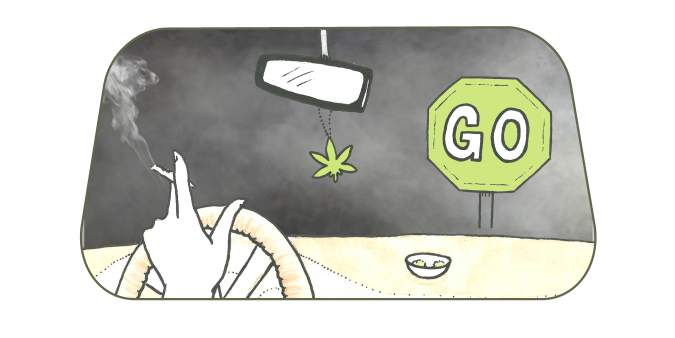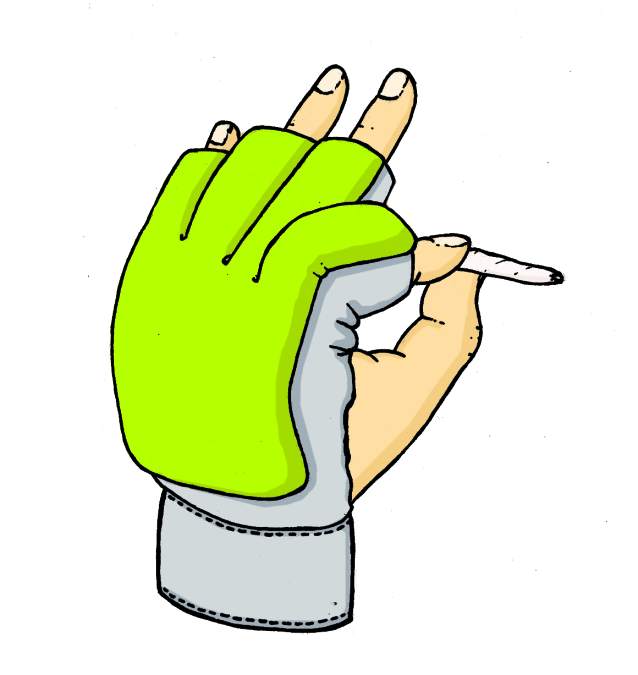Shooting down a few anti-legalization arguments.
“They’re talking about opening a weed stand, or whatever, right next to my kids’ school,” the woman began, reaching for a plastic cup of wine during ArtWalk. “I mean, they’re already getting drunk. Now this will make a second thing we’re allowing for!”
I gently reminded her that both of those things were illegal for minors, but she would have none of it.
“Seriously. The parties they go to are beyond,” she said, gazing at an out-of-this-world painting on the gallery wall. “From eighth grade on, there is alcohol at most of their socials. That’s already happening. So to add another drug that can mess up their minds . . . ”
I understood the fear she was experiencing. Parenting is terrifying. I get it; I had a teenage daughter once. (Good lord.) But one way to alleviate some of the fear about our kids having sex or smoking dope or getting shot on the playground is by clarifying some of the misinformation and having open dialogue. (That’s the theory.)
“To be honest, I’d rather have my kid on weed than alcohol, ma’am.” She was only a few years older than me, but we hadn’t been properly introduced. “I mean, alcohol kills 46,000 people a year, prescription drug ODs kill another 17,000. And let’s not forget cigarettes!” (440,000 deaths a year.) “And so when it comes to these kids drinking and driving or smoking and driving . . . I’d prefer they had cannabis.”
Jesus. I’d wanted to come off as even-handed and open-minded, and now I was advocating that the youngsters hotbox in their daddy’s Chevrolet.
“Do you have kids!?” she inquired. “It’s hard enough. I mean, the store is going to be right there. At the foot of the school!”
I didn’t want to get into the specifics of her increasingly incoherent argument—in Washington state, recreational shops must be at least 1,000 feet from schools, playgrounds, libraries, game arcades, public-transit centers, or parks. But I did feel the need to make one point.
“I’m sorry, miss—what was your name?”
“Jane.”
“Hi, Jane. Can I call you Mary Jane?” (Blank stare.) “I’m kidding. Listen, I totally agree that we should try to keep drugs away from young people.” I felt myself go into talking-points mode, but I couldn’t stop. “And I know this seems counterintuitive, but teen drug use has gone down in the states where it’s legal. That’s just a fact.”
I knew right when it came out of my mouth that it was too preachy, but I’ve learned a few things writing this column. One is that kids don’t know shit about cannabis, other than that it is, and always has been, easy to get. A new 2014 Health Use Survey shows that a significant number of 10th and 12th graders don’t believe there are risks in weekly marijuana use. (On this, they’re obviously pinheads—pot is not great for the developing brain.) It also found that parents were also clueless: Only 57 percent knew the legal age of recreational weed (as compared to 71 percent of kids), and only 63 percent understood you’re not allowed to grow it at home.
“Why make matters worse?” she railed, spilling chardonnay on my shoes. “There are already so many drugs: They take Ecstasy and prescription pills! I’m telling you—what I heard is that they walk right in and order, like a Starbucks or something.”
“Thing is, Jane, recreational-marijuana stores are not selling to high-school kids. They’re just like bars—they don’t want to get shut down for not checking IDs. Besides, whoever is selling your kid a bag of weed behind the Port-a-Pottys at Lakeside is not going to be asking if they’re 21, and there won’t be a warning label listing the THC levels.”
We stared at a painting that could have been a giant bong or a lovely vase—it kind of depended on your perspective.
“The new stuff is just so much stronger, you can OD on it,” she said with a smile-ish smirk that made me want to hug-strangle her. “I read something in the paper about synthetic marijuana killing these kids at a party in Florida.”
“Yes, and they should stop calling it marijuana. AstroTurf would be a better name, because it’s not really marijuana. Jane, there are all kinds of deadly drugs out there, but pot’s never killed anyone. Not one person.”
I was going to ask her if she’d ever tried cannabis, but could tell I’d already pushed her personal boundaries. “Have you talked to your . . . daughter, is it? About weed?” I asked meekly. “About marijuana?”
Her eyebrows would have gone higher if they could have. “Talked? To her about pot?! What would we say? I mean, she knows we don’t approve.”
“That’s great! A recent study from the UW showed that kids listen to their parents more than anyone else—even their own friends. And the ones who know their parents disapprove are way less likely to try pot.”
“Well that’s good, I guess,” she replied, looking me in the eye for the first time.
“The other thing is that talking to kids about weed works better than punishment.” A raised eyebrow. “In this study [from the UW’s School of Social Work], students who got suspended after smoking pot kept smoking pot. But if the kid gets sent to a counselor, they’re 50 percent less likely to smoke!”
“I assume you get stoned.”
I pulled the wine bottle out of the tub of ice. “I use all kinds of legal drugs, Jane,” I said, topping us off. “Takes the edge off of being a grown-up . . . ”
This article first appeared in the Seattle Weekly.





